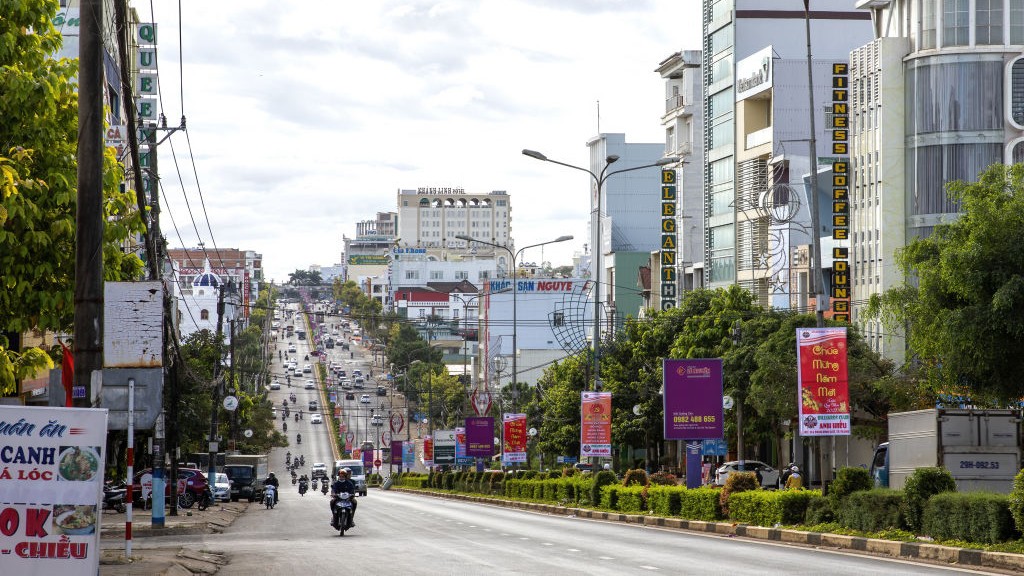Geopolitical advantages might make Vietnam wealthy
The tensions between the United States and China could prove beneficial in Hanoi


A free daily email with the biggest news stories of the day – and the best features from TheWeek.com
You are now subscribed
Your newsletter sign-up was successful
The United States and China have seen their relationship continue to sour as the two countries compete on the global stage. But while the superpower pair seeks to edge each other out in a race to own the next decade, there is a third party that could benefit most of all: Vietnam.
The Southeast Asian country has historically struggled economically, but there have been signs over the past few years that change might be beginning. Vietnam had the 35th-largest economy in 2023, according to the International Monetary Fund, and its poverty rate has been shrinking at a rapid pace.
And while the country's economy has been on an upswing, the competition between the U.S. and China could turbocharge Vietnam's economic growth in a way the country has yet to see. Could the race between the U.S. and China create a new power structure that benefits the halls of Hanoi?
The Week
Escape your echo chamber. Get the facts behind the news, plus analysis from multiple perspectives.

Sign up for The Week's Free Newsletters
From our morning news briefing to a weekly Good News Newsletter, get the best of The Week delivered directly to your inbox.
From our morning news briefing to a weekly Good News Newsletter, get the best of The Week delivered directly to your inbox.
Why are the US and China trying to win over Vietnam?
Vietnam has "shrewdly positioned itself halfway between China and America, prompting both superpowers to woo it," The Economist said. Notably, Vietnam was the only country in 2023 to receive state visits from both President Joe Biden and Chinese President Xi Jinping. Hanoi's balancing act between these complex, competing geopolitical interests is now known as "bamboo diplomacy."
Vietnam seemingly has more in common with China than with the U.S. Besides cultural similarities, both nations are one-party states led by their respective communist parties. However, Vietnam's system of government is generally considered more democratic and less restrictive than China's, which most experts view as an authoritarian regime. As a result, many "ordinary Vietnamese are deeply suspicious of their giant, bullying neighbor," The Economist said, largely as a consequence of China staking claims on Vietnam's portions of the South China Sea.
This has led both the United States and China to jostle for a position at Vietnam's side, especially as the two countries continue to fight for dominance on the world stage. While Vietnam has shrugged off a formal alliance with the U.S., the two countries last year upped their relations to a "comprehensive strategic partnership," which the White House called a chance for "more extensive and innovative economic engagement."
Beyond economic advantages, when it comes to Southeast Asia, Vietnam is the region's military "fulcrum state," the Council on Foreign Relations (CFR) said. The country has a "large and professional military ... and, if it is clearly aligned with one side or the other, the capability of tipping the regional security balance," the CFR said. So as the fight between the U.S. and China brews, Vietnam straddles the line between both. The recent cooperation with the U.S. has "led many analysts to see Vietnam, after Singapore, as Washington’s closest security partner in Southeast Asia," the CFR added. Economically, though, "Vietnamese leadership still probably views China as their closest strategic partner."
A free daily email with the biggest news stories of the day – and the best features from TheWeek.com
How is this benefiting Vietnam?
The breakdown of U.S.-China relations has seen Vietnam "[emerge] as one of the rare winners during recent years of de-globalization," Forbes said. Its bamboo diplomacy has "enabled it to upgrade relations with the West while maintaining positive ties with its largest trading partner, China." As a result, Vietnam has expanded its business opportunities both domestically and with foreign markets. The nation, said Forbes, has "invested heavily in education and infrastructure while offering industrial wages about half as high as those in China."
This has led to countries around the world pouring resources into Vietnam, with the country's General Statistics Office reporting $36.6 billion in direct foreign investments in 2023. This represented a 32.1% year-over-year increase and was the highest level of foreign investment in Vietnam in five years, the office reported. Beyond the geopolitical issues, "relatively lower wages and a youthful population have provided Vietnam with a solid workforce and consumer base, bolstering the case to invest," CNN said.
But there is a catch in all of this. Vietnam's domestic stock changes are considered frontier markets by the West, which "puts Vietnamese stocks off limits to many global investors and family offices," Forbes noted. While this is a major challenge for Vietnam's growth, the last few years have shown that the "government's ambition to turn Vietnam into a rich country by 2045 is plausible," The Economist said. "Economically it has probably never faced a more benign global environment."
Justin Klawans has worked as a staff writer at The Week since 2022. He began his career covering local news before joining Newsweek as a breaking news reporter, where he wrote about politics, national and global affairs, business, crime, sports, film, television and other news. Justin has also freelanced for outlets including Collider and United Press International.
